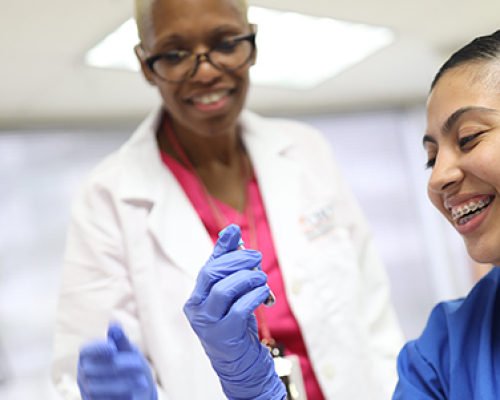
-
Programs
-
On-Campus Programs
- Cardiac Sonography AAS
- Cardiovascular Sonography AAS
- Dental Assistant Certificate
- Diagnostic Medical Sonography AAS
- Echocardiography Certificate
- Emergency Medical Technician Certificate
- Health & Medical Administrative Services AAS
- Limited Medical Radiologic Technologist with MA Skills Certificate
- Medical Assistant Certificate
- Medical Coding & Billing Certificate
- Nursing (LVN to ADN) AAS
- Ophthalmic Assistant Certificate
- Pharmacy Technician Certificate
- Physical Therapy Technician Certificate
- Rehabilitation Therapy Technician Certificate
- Surgical Technology AAS
- Vocational Nursing Certificate
-
Online Programs
- Coding & Revenue Cycle Management AAS
- Dental Assisting Certificate
- Health & Medical Administrative Services AAS
- Health Care Management AAS
- Healthcare Administration Bachelor's
- Health Care Office Administration Certificate
- Medical Assisting Certificate
- Medical Billing & Coding Certificate
- Pharmacy Technician Certificate
- Radiologic Science Management Bachelor's
- Radiologic Technology AAS
- Seminars
-
On-Campus Programs
- Campuses
- Why CHCP
- Admissions
- Student Services
- Resources
- Careers at CHCP
- Contact Us
- Blog
- Business to Business
Start Your Application
Request Info
-
On-Campus Programs
- Cardiac Sonography AAS
- Cardiovascular Sonography AAS
- Dental Assistant Certificate
- Diagnostic Medical Sonography AAS
- Echocardiography Certificate
- Emergency Medical Technician Certificate
- Health & Medical Administrative Services AAS
- Limited Medical Radiologic Technologist with MA Skills Certificate
- Medical Assistant Certificate
- Medical Coding & Billing Certificate
- Nursing (LVN to ADN) AAS
- Ophthalmic Assistant Certificate
- Pharmacy Technician Certificate
- Physical Therapy Technician Certificate
- Rehabilitation Therapy Technician Certificate
- Surgical Technology AAS
- Vocational Nursing Certificate
-
Online Programs
- Coding & Revenue Cycle Management AAS
- Dental Assisting Certificate
- Health & Medical Administrative Services AAS
- Health Care Management AAS
- Healthcare Administration Bachelor's
- Health Care Office Administration Certificate
- Medical Assisting Certificate
- Medical Billing & Coding Certificate
- Pharmacy Technician Certificate
- Radiologic Science Management Bachelor's
- Radiologic Technology AAS
- Seminars
- Campuses
- Why CHCP
- Admissions
- Student Services
- Resources
- Careers at CHCP
- Contact Us
- Blog
- Business to Business







